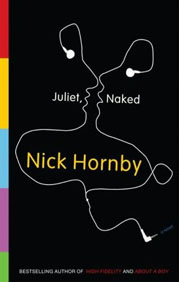Nick Hornby taps into a gold mine of insider humor in “Juliet, Naked” by making fun of extreme levels of music snobbery. Hornby invents a cult-favorite 1980s musician named Tucker Crowe and provides so much analytical detail about this made-up musician’s songs that I almost wanted to google Crowe to make sure he wasn’t a real person.
Like Hornby’s classic “High Fidelity,” this novel is half about music and half about relationships. The central couple, who live in Gooleness, England (a town so dull that action verbs aren’t used in reference to it), is Duncan and Annie. Duncan is a self-appointed Crowologist who runs a Web site analyzing the music of this musician who’s best and last album, “Juliet,” came out in 1986, just before he became an almost Salingeresque recluse. Annie is also a fan of “Juliet,” but she doesn’t engage in Duncan’s level of pretension, where he assumes certain interpretations of the songs are “correct” and all other takes are “incorrect.”
(Just for the record, I don’t think Hornby — despite his background as a music critic — is a music snob on the level the Crowologists, but I suspect he has found himself approaching that level of obsession, and that he knows people like Duncan. Same thing for me as a reader: In college, me and my friend Travis used to describe songs we liked as “tasty” — something George Carlin would’ve shot us for — but I’ve never stalked my favorite musicians. In fact, I don’t even know the names of all the members of my favorite bands. Still, I and Hornby and his fans GET people like Duncan; we know we are only a few steps away from becoming Duncan.)
Another character, living in Pennsylvania, is Tucker Crowe himself. We learn that the Crowologists’ theories about Crowe have spiraled a long way from reality. Their mythology has little to do with the man, who had rather simple reasons for quitting music.
Crowe’s management puts out “Juliet, Naked,” a collection of rough cuts from “Juliet.” When the Crowe fans of the world weigh in on the album, Crowe connects with one of them via e-mail: Annie.
One of the big clashes between Duncan and Annie is that she opens his mail and listens to “Juliet, Naked” first. She knows he’ll take it as a punch in the gut to their relationship, but she does it anyway. In retaliation, Duncan posts a “Naked” review, writing that it puts to shame the original (known inevitably to insiders as “Dressed”). And by doing so, he later realizes, he has skewed the whole reception of the album by being overly positive.
Only someone obsessed with an artist can dismiss their best work in favor of the rough version of that work. A real-world example might be how “Born in the U.S.A.” is brushed aside by so many Bruce Springsteen fans, when clearly it is an artistic breakthrough, at least from a pop standpoint. Am I right? Or is it equally dangerous to assume that the version the artist releases truly is the best version?

These are the types of questions raised in “Juliet, Naked,” and maybe the questions themselves put the novel on a plane of music insider-ness far removed from the mainstream. I don’t think so, though — I think even casual music lovers will find this book funny.
I don’t want to pull a Duncan and say that “Juliet, Naked” blows away all of Hornby’s previous works, puts them to shame even (after all, “High Fidelity” and “About a Boy” set the bar high), but … I kind of think it does.

